Vietnam SuperPort: Exploring new terrain in green logistics
Given the ongoing climate crisis, how critical is the role of the logistics industry in combating climate change?
I believe that logistics plays a critical role in combating climate change. We’re taking decisive action by investing in electric vehicle fleets and exploring hydrogen technology for long-haul transport.
We’re also leveraging our strategic location to promote multimodal transportation systems, emphasising environmentally friendly options like inland waterways and rail. Our unique position allows us to influence regional and global supply chains, and we’re collaborating to optimise operations for sustainability.
We’re committed to leading this charge, setting new standards for sustainable logistics in Southeast Asia and beyond.
 |
| Yap Kwong Weng, CEO of Vietnam SuperPort |
Vietnam SuperPort has unveiled a goal of achieving net-zero by 2040. Why is it important for your company to do this?
Our commitment to achieving net-zero by 2040 is a strategic imperative that addresses multiple critical factors. This goal demonstrates our environmental stewardship, aligning with global sustainability efforts and positioning us as an industry leader. It helps us mitigate regulatory risks, drive operational efficiencies, and unlock new economic opportunities in the evolving green economy.
Our net-zero commitment gives us a competitive edge while meeting growing stakeholder expectations. By transitioning to net-zero, we’re building long-term resilience against environmental and market challenges, reducing our reliance on fossil fuels, and adapting our infrastructure for future sustainability.
Ultimately, this goal reflects our vision of being a sustainable, innovative, and responsible leader in the logistics industry, ensuring our long-term success in a rapidly changing global landscape.
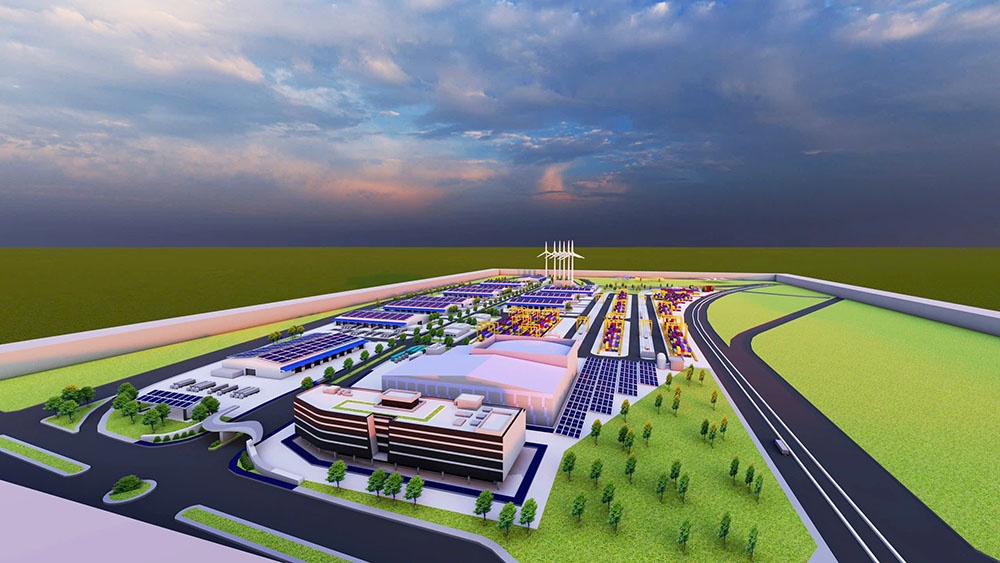 |
What are the critical steps you will take to achieve the net-zero goal?
We will achieve this mission in Vietnam through a multifaceted approach encompassing infrastructure transformation, energy transition, and transportation optimisation.
Key steps include integrating renewable energy sources such as solar, wind, and hydrogen; transitioning to a fully electric vehicle fleet supported by expanded charging infrastructure; implementing multimodal connectivity to streamline logistics and reduce carbon footprint; and leveraging advanced digital tools to enhance operational efficiency.
We will also be designing sustainable port facilities, developing infrastructure for low-carbon fuels, installing shore-to-ship power systems, offsetting residual emissions through carbon credits, collaborating with stakeholders, and implementing robust monitoring and reporting systems. This strategy will position Vietnam SuperPort well in sustainable port operations, significantly contributing to the reduction of carbon emissions and setting a new standard for eco-friendly logistics hubs in the region.
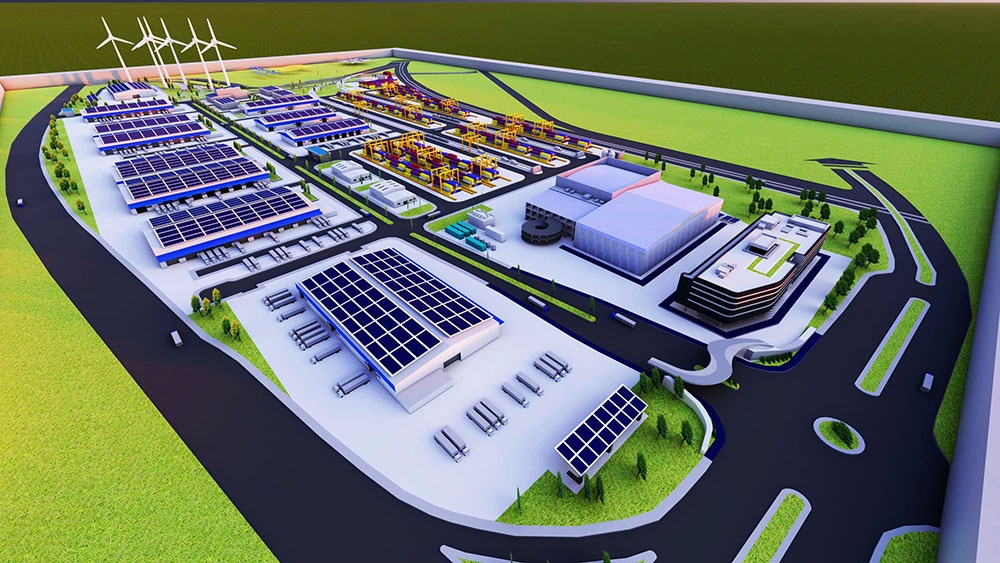 |
Vietnam SuperPort is pioneering sustainability through digital transformation. Could you share initiatives to embrace this?
We will drive the green transition through a comprehensive digital ecosystem, capable of optimising routes
and reducing carbon emissions while tracking resource use. Our smart infrastructure investments will include intelligent lighting, energy efficient HVAC systems through a comprehensive digital ecosystem, and renewable energy integration, all of which contribute to substantial energy savings.
We will also develop a data analytics and environmental, social, and governance management platform that will continuously monitor and optimise environmental performance, allowing us to track carbon emissions, identify areas for improvement and measure progress against global standards.
What are the challenges of a net-zero transition, and how does Vietnam SuperPort overcome them?
We recognise the multifaceted challenges of the net-zero transition, including technological barriers, financial considerations, operational complexities, regulatory compliance, and stakeholder engagement.
To overcome these, we’ve implemented a comprehensive strategy that leverages strategic partnerships with technology providers and public-private collaborations to access cutting-edge green technologies. Our approach balances substantial initial investments with long-term cost savings through renewable energy infrastructure and digital optimisation tools. The key point is to enhance our operational efficiency and global competitiveness while significantly reducing our environmental impact.
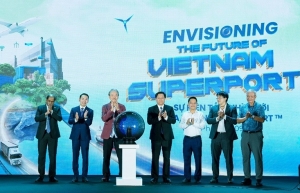 | Vietnam SuperPort marks vision of a connected future The recent launch of Vietnam SuperPort marks a critical hub connecting supply chains between China and Southeast Asia, with an ambitious goal of achieving net-zero by 2040. This milestone enhances Vietnam’s logistics capabilities while contributing to the nation’s climate change objectives. |
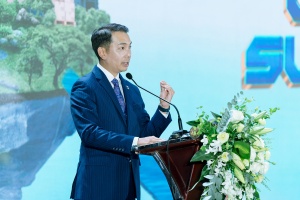 | Vietnam SuperPort to elevate supply chain capabilities Vietnam SuperPort, a joint venture between YCH Group (Singapore) and T&T Group (Vietnam), has launched the new vision to enhance the country's logistics capabilities. Yap Kwong Weng, CEO of Vietnam SuperPort spoke to VIR's Nguyen Huong about the launch. |
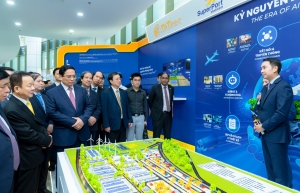 | Vietnam SuperPort unveils digital transformation plan to boost connectivity The ICD Vinh Phuc (Vietnam SuperPort), jointly developed by a T&T Group - YCH (Singapore) joint venture, announced plans to drive efficiency and sustainability in the logistics sector at the Vietnam Innovation Day 2024 on October 1. |
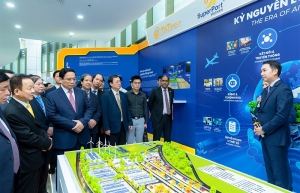 | Vietnam SuperPort lives up to name with sustainability drive Vietnam SuperPort, a joint venture between YCH Group of Singapore and Vietnam’s T&T Group, is at the forefront of sustainability and digital changes to build the first net-zero multi-modal logistics hub in Southeast Asia. |
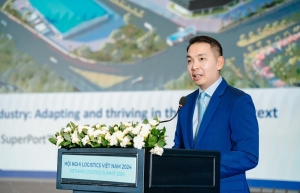 | Vietnam SuperPort poised to elevate Vietnam's logistics capabilities Vietnam SuperPort, a joint venture between YCH Group of Singapore and Vietnam’s T&T Group, is poised to enhance Vietnam’s logistics capabilities in the global supply chain. |
What the stars mean:
★ Poor ★ ★ Promising ★★★ Good ★★★★ Very good ★★★★★ Exceptional
Related Contents
Latest News
More News
- A golden time to shine within ASEAN (February 19, 2026 | 20:22)
- Vietnam’s pivotal year for advancing sustainability (February 19, 2026 | 08:44)
- Strengthening the core role of industry and trade (February 19, 2026 | 08:35)
- Future orientations for healthcare improvements (February 19, 2026 | 08:29)
- Infrastructure orientations suitable for a new chapter (February 19, 2026 | 08:15)
- Innovation breakthroughs that can elevate the nation (February 19, 2026 | 08:08)
- ABB Robotics hosts SOMA Value Provider Conference in Vietnam (February 19, 2026 | 08:00)
- Entire financial sector steps firmly into a new spring (February 17, 2026 | 13:40)
- Digital security fundamental for better and faster decision-making (February 13, 2026 | 10:50)
- Aircraft makers urge out-the-box thinking (February 13, 2026 | 10:39)

 Tag:
Tag:















 Mobile Version
Mobile Version